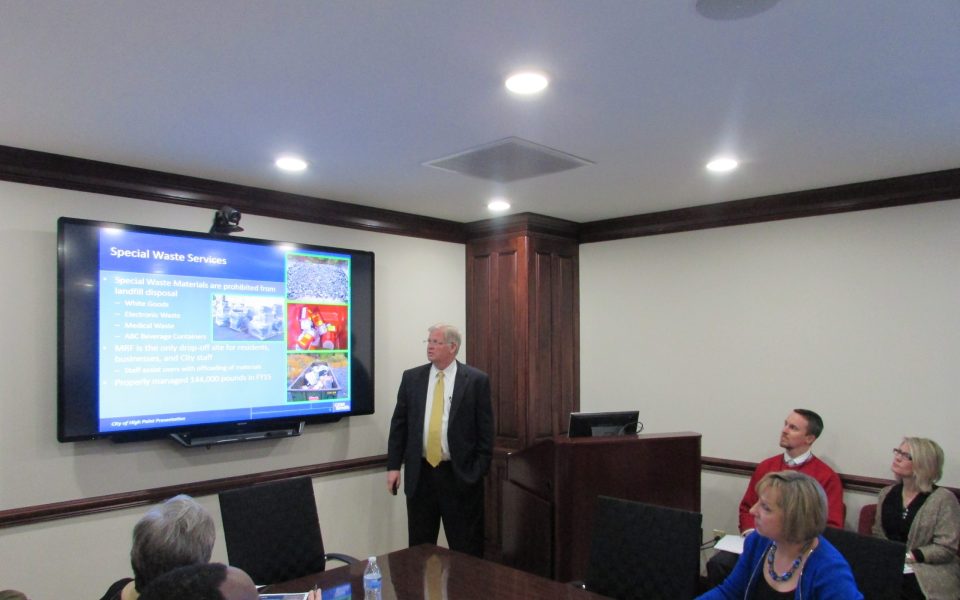by Jordan Green
The city of High Point will invest in equipment upgrades at its Material Recovery Facility, where conveyor belts are literally held together with duct tape, and continue to operate the facility instead of outsourcing the function to a private company.
The city of High Point will invest about $4 million to upgrade its Material Recovery Facility and continue to operate it with a staff of 12 following a 6-3 vote on Monday, in which the city council decided against outsourcing the function to a company in Davidson County.
Known to city officials by its acronym the MRF (or “murf”), the facility opened in 1990. The facility relies on manual sorting to divert recyclable materials such as glass bottles and paper from the city-operated landfill, with an estimated annual cost savings of $2.7 million. A consultant with the firm CDM Smith told council members that, as reflection of how run down the equipment has become at the facility, conveyor belts are being held together with duct tape. The lowest bidder, North Davidson Garbage Services, proposed to take over the function for $484,413, compared to $666,020 — the cost to the city after upgrades. Base proposals from two other vendors, Waste Management and ReCommunity, came in above what the city would spend.
During a special meeting on Monday, Deputy City Manager Randy McCaslin urged the council to not delay a decision.
“We really need an answer quick on this,” he said. “If you can vote tonight that would be great. Our equipment is falling apart. If we’re gonna keep it in house, we’ve got to make that investment pretty quickly. Quite honestly, we’ve got some employees out there who have been on edge for three or four years about whether they’re gonna lose their jobs.”
Some council members noted the differential between the bid from North Davidson Garbage Services and the two other vendors. And while they said it was clear that North Davidson Garage Services wants the city’s business, they also expressed concern about the risk of contracting out to business with a relatively unknown track record.
“If North Davidson ended up high and dry, there’s no way we’re gonna get that price from Waste Management or ReCommunity,” said Councilman Latimer Alexander, an at-large representative. “They’ll know they’ve got us.”
Alexander made a motion to make improvements to the MRF and have the city continue to operate the facility. Councilman Chris Williams, seconded the motion. The motion carried 6-3, with Mayor Pro Tem Jim Davis, Councilman Jay Wagner and Councilman Jason Ewing voting in the minority.
Davis made an unsuccessful substitute motion to continue the item until March 21. Wagner, who supported Davis’ motion, argued that the city is “subsidizing” the MRF to the tune of $1 million, citing the current cost of operating the facility, as opposed to the reduced cost after the upgrades are completed.
“We’re subsidizing a business that’s in competition with the private market,” he said. “That’s unfair. It’s like if the city put a grocery store in a neighborhood and went into competition with Food Lion and Harris-Teeter.”
McCaslin said even the city had opted to outsource materials recovery to a private company, the city still would have to invest $300,000 to $400,000 because the private companies aren’t willing to handle old appliances, medical waste and electronics.
Mayor Bill Bencini agreed with Alexander and Williams that the biannual furniture market, which relies on the city to collect packing material and other recyclables, changes the dynamic. Williams, who is employed by International Market Centers, said the turnaround time for the city to haul off packing material is about an hour, but estimated that if the function was outsourced to North Davidson Garbage Services, which operates its own facility in Davidson County, the turnaround time could double. When recyclables accumulate on the loading docks, it can impede new furniture shipments, he said.
“With the sheer volume of recyclables, when you consider the risk that could happen when you privatize this and that the furniture industry generates $5.4 billion for the region, that’s not a risk I’m willing to take,” Williams said.
Join the First Amendment Society, a membership that goes directly to funding TCB‘s newsroom.
We believe that reporting can save the world.
The TCB First Amendment Society recognizes the vital role of a free, unfettered press with a bundling of local experiences designed to build community, and unique engagements with our newsroom that will help you understand, and shape, local journalism’s critical role in uplifting the people in our cities.
All revenue goes directly into the newsroom as reporters’ salaries and freelance commissions.


Jordan,
Correction. The cost to upgrade the MRF is roughly $4,000,000, which is money we will never make back on an operation that loses $600,000 to $1,000,000 per year.
Jay Wagner.
Thanks for pointing that out, Jay. I’ve fixed the error in the digital version. I don’t know how I got that wrong. I have the correct figure in my notes but somehow transposed it into the story incorrectly.